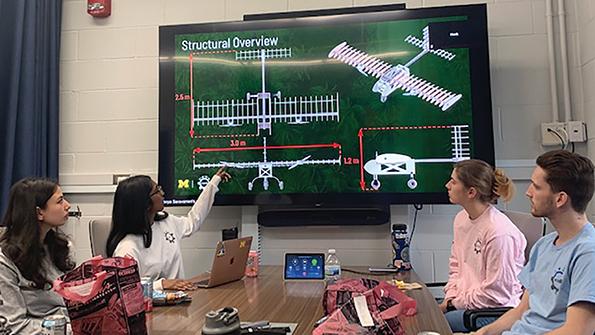Opinion: Five Megatrends Higher Education Must Address

The aerospace industry has always been at the leading edge of change. Progressive aerospace engineering departments therefore need to anticipate major industry shifts years in advance—from product design to enabling technologies—while still delivering a solid education in engineering fundamentals. Where should we place our bets from a research standpoint? What skills will students need in 10 or 20 years?
The University of Michigan’s aerospace engineering department recently completed a strategic review of the changing aerospace landscape and identified five megatrends that will shape the future:
Sustainable Air Transportation
The International Air Transport Association recently committed to net-zero emissions by 2050 through a combination of new aircraft technologies and architectures, sustainable fuels, improved operations and market-based measures (e.g. offsets and carbon taxes). While our department is well versed in researching aircraft technologies such as electrical systems and novel aircraft architectures, it has less experience with aircraft operations and has yet to delve into sustainable fuels, which will require collaboration with chemical engineering colleagues. There is also a wide array of propulsion technologies, from improved conventional gas turbines to new approaches including hydrogen, hybrid-electric and all-electric. Like aeroengine OEMs, we need to explore all of these and conduct basic research. Eventually, we will need to narrow our focus as viable solutions emerge. We cannot be all things to all people.
Digital Engineering
Development time and costs of new aircraft, engines and many spacecraft are increasing at an unsustainable rate. Digital processes can attack this problem by connecting design/development and production/sustainment functions. This integration inevitably will lead to certification by design. Emerging computing paradigms can be researched to increase fidelity of predictions of increasingly complex systems. Data will play an increasingly important role, and new tools are needed to integrate models and data to enable fast and real-time operational capabilities. Model-based systems engineering (MBSE) will become a mainstay for aerospace engineers. For this reason, our department opened a laboratory last year where students can design, build, test and fly aircraft using MBSE tools and processes.
Democratization of the Commercial Space Industry
The space industry has changed considerably since the enactment of the U.S. Commercial Space Launch Amendments Act of 2004. New entrants have engaged in vigorous competition for launch services, lowering the cost and reducing entry barriers. This has made room for small, low-cost satellites, new space exploration missions and new space technology development. Electric propulsion is growing for spacecraft and is the leading candidate for long-endurance missions, while alternative means based on nuclear propulsion and electrosprays are being studied. NASA’s plans to create a Moon base provide new opportunities for space vehicles, robotics, materials and space exploration. Space tourism is also becoming a reality. A growing percentage of our students are enrolling in aerospace engineering because of the excitement of “new space.”
Resilient Autonomous Systems
Technology, coupled with marketplace pull, is ushering in the era of autonomous systems. The military is embracing autonomy as a means of improving effectiveness, and by 2050, it is anticipated that up to 50% of military aircraft could be autonomous or tied to crewed aircraft using concepts such as loyal wingman. Autonomy in dynamic and unstructured environments and cybersecurity are research areas of increasing importance. Aerospace engineers must gain exposure to software, autonomy and robotics to complement theoretical foundations. Computational and theoretical advances for resilient and safe operation of large-scale networked systems and large-scale autonomy and optimization, among other things, present fruitful directions for research.
Advanced Air Mobility
Autonomous technology is increasingly being used for commercial drones and eventually will enable this fifth megatrend, which is attracting hundreds of new entrants and billions of dollars in investment. The opportunity and challenges here necessitate significant technological advancements in air traffic management, sensors and data networks, uncrewed aerial system propulsion/control, payloads and collective dynamics. The need for strong research programs in these areas is underscored by emerging industry and defense needs.
The scope of opportunities from these five megatrends is massive, but one thing is evident: The traditional aerospace engineering curriculum must evolve to include flexible, interdisciplinary coursework and hands-on laboratories. Successful aerospace engineering programs will collaborate with other departments—and institutions—to equip students with the knowledge and training to become leaders.
Anthony Waas is the Richard Auhll department chair of aerospace engineering at the University of Michigan, Ann Arbor.
The views expressed are not necessarily those of Aviation Week.





Comments
Since I had a bum amblyopic right eye, I wouldn't be able to get a 1st class medical so that sealed the deal for me. Even though I soloed at 16,
I always loved math and sciences and I consider that I haven’t yet finished learning or refreshing what I learned almost 50 years ago. Therefore I am reading again lectures in feedback & control, power electronics, metallurgy, special relativity, Riemann geometry, etc. and of course, also history of air and space. I love travelling as well as reading Human History. I believe that our politicians are history-illiterate and it explains why so many mistakes are made.
You will notice that I do not mention anything about literature. Right, I have never been attracted by literature, poetry, etc. Although I loved learning foreign languages and being able to read/write/speak anything else than my native tongue, studying literature whatever French, Dutch, German or English was for me plain boring. I was more than happy that literature was never a subject when at university. One cannot love everything!
Bernard Guillaume